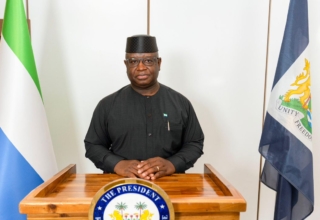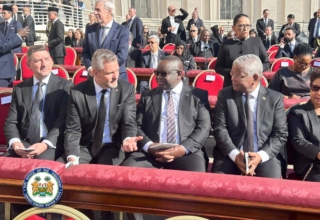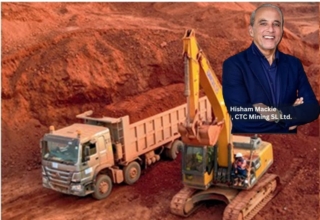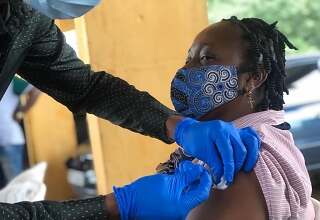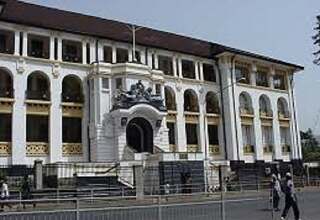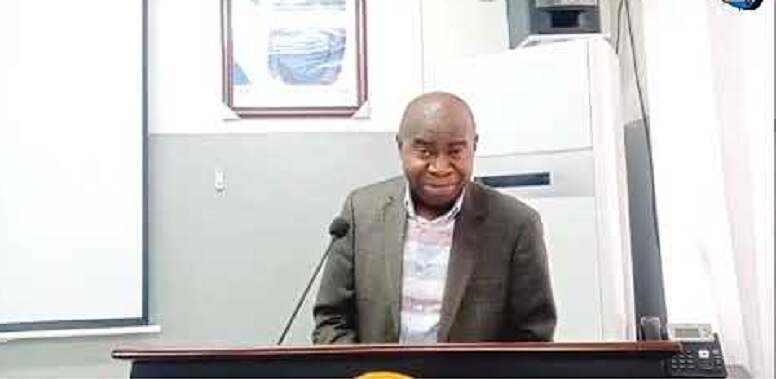
At the World Bank Headquarters in Washington, DC, Sierra Leone’s Financial Secretary Sahr Lahai Jusu impressed colleague panelists and his audience at the World Bank -IMF Annual Meeting.
As the world faces threat from multiple crises, the private sector must play a critical role in addressing these challenges. The International Development Association’s Private Sector Window is an important tool to catalyze high impact private sector solutions in the poorest and most fragile markets
The IDA Private Sector Window: Catalyzing Private Sector Investment in Uncertain Times, Financial Secretary tried to proffer solutions.
On this note, there is no path to development and improved prosperity without the private sector. Governments play a critical role in providing stability and the institutional underpinnings of successful economies. But it is the private sector that provides the bulk of the innovation and investment needed to drive job creation, raise living standards, and bring people out of poverty. The IDA Private Sector Window (PSW) was launched in 2017 to catalyze private sector investment in the poorest and most fragile countries. The PSW blends concessional funds with private investments to help mitigate a variety of risks—ranging from credit risk, currency devaluation, to political risks—thus enabling high-impact projects and private capital flows which would otherwise not happen.
Therefore, the side event at the 2022 Annual Meetings of the World Bank and IMF brings together a range of stakeholders, including IDA donors, borrowing countries, and the private sector to explore how Private Sector Window resources can be optimized to continue catalyzing high-impact private sector investment in times of uncertainty. Hinging on the lessons learned will help ensure that the IDA PSW continues to evolve and respond to multiple threats while enabling private sector-led opportunities to build a more resilient and inclusive future in the poorest and most vulnerable countries.
MODERATOR: Mr. Jusu, thank you for being with us today. Could you describe where the private sector fits within Sierra Leone’s development strategy? Why is the private sector important for borrower countries?
- JUSU: Sierra Leone, like many IDA countries, has been hit by many crises since the 1990s. After 11 years of civil conflict that destroyed the state’s economic fabric, the economy rebounded in 2012-14, fuelled by booming iron ore prices. Real GDP in 2013/2014 was about 20%. The economy was on an upward trajectory, classified as the fastest growing economy in Sub-Saharan Africa when the country was hit by the twin shocks of the Ebola virus disease and the collapse of iron ore prices in 2014. This has been followed by the current twin shocks of the COVID-19 Pandemic and the Russian-Ukraine crisis. While these have created significant challenges for the country, the fundamentals remain the same – the country’s natural resource endowments in mining, agriculture and its deep natural harbour means there is enormous growth potential, but there is a need to diversify the economy and create jobs to reduce poverty through private sector participation.
We believe competitiveness is a critical driver of growth. Therefore, the private sector is integral to Sierra Leone’s development strategy. It is a crucial driver for job creation, and economic growth as micro, small and medium-sized enterprises (MSMEs) represent 70 percent of employment in the country. The private sector has shown over the years that it could work more efficiently than state-owned enterprises, and lead efficiency in certain sectors. It also brings both capital and know-how – making it one of the best means to ensure skill transfer to our people.
In Sierra Leone’s private sector experience, many of the challenges that affect other IDA borrower counties, including a small and fragmented private sector that struggles to attract finance, capital markets are underdeveloped and have limited capacity to support financial institutions and larger businesses, or in some countries, capital markets does not even exist. This shows a strong need for additional investment in private sector development and the capability of Governments to attract funding from the private sector.
However, providers of private finance pay close attention to the associated risks in making such financing available to Governments. Thus, Sierra Leone, despite having enjoyed peace, stability and strong growth since the end of the conflict in 2002, continues to suffer from negative risk perceptions. Investors who consider investing in markets that have emerged from conflict or fragility remain a challenge. Many foreign private firms will look at SL as a small market with high risks.
Additionally, there are many competing demands on public finances in all borrower countries. Thus, the IDA-PSW plays a critical role in filling this resource gap by serving as a source of co-investment funds and guarantees to de-risk private sector initiatives. It is already proving to be a viable option when other commercial solutions and the traditional World Bank Group lending operations are insufficient.
MODERATOR: What role is there for development finance institutions working to support countries’ strategies for developing their private sector?
MR.JUSU – The multiple crises have reminded us that government resources and capacity are constrained. Poor infrastructure, such as roads, energy and water, make it costly or even impossible for the private sector to invest.
Countries like Sierra Leone are building fiscal credibility, undertaking needed infrastructure investments and offering unique, untapped opportunities for the private sector, yet, we still struggle to attract private sector investment. All of us, IDA borrowers and lenders, cannot allow this to continue. Imagine the mutually beneficial opportunities from the African Continent-54 countries with a combined population of 1.3 billion and a GDP of US $3.4 trillion that can significantly impact global trade and investment.
Sourcing innovative financing instruments is currently the leading approach to funding a broad portfolio of innovative projects across developing countries. Therefore, we need development financial institutions to de-risk private sector investment in IDA countries. The use of blended concessional finance and IDA PSW resources can mobilise other investors to support the financing of the private sector. For every dollar of IDA PSW resources in IFC and MIGA-supported projects, there are five additional dollars directed to private sector investments. They also serve an important demonstration effect for other investors, boosting confidence and encouraging other investments. That is why this program is very important and needs to be further strengthened
Sierra Leone has benefited from IDA PSW (Dole and Orange Telecom) investments that are – aligned with the national development strategies with regards to expanding telecom outreach to the population. One of them, Sonatel invested more than $200 million in Sierra Leone, improving access to digital communications and mobile broadband. This was enabled by IDA PSW-supported guarantees from MIGA. Also, Dole established a tropical fruit cultivation and processing facility with more than 1,000 new jobs in the agriculture sector. There are other pipeline projects for which I would urge International Finance Corporation of the World Bank to expedite the processing-IFC VP recently visited a potential onion production farm, which, when developed, will create jobs, produce onions for both local consumption and exports as well as have positive impacts on foreign exchange flow.
Under the challenging times we see today; I do not believe that the IDA-PSW program as structured meets all the goals we have set for it. Having the unique perspective of being actively involved with both IDA and the private sector over the last few years, I have a number of suggestions that I believe could help to promote private sector investment in low-income countries during the period of uncertainty:
1) One of the major issues with the IDA PSW program is the lack of availability of a grant system to help pay a portion of development costs for a project. Due to the lack of legislation related to some of the sectors, a private power sector developer spent about US$16m on legal fees, a very high amount. If IDA-PSW had made focus support by footing some of the bills within the context of partnership framework, the development cost of such project would reduce. A facility to pay a portion of third party development costs for the private parties will spur investment as firms will see a smaller risk profile in the beginning;
2) The second issue is screening and marketing. While sophisticated investors know what IDA PSW has to offer, many do not. I recommend that instead of waiting for firms to come to IDA asking for help, IDA should do the opposite and seek out projects to support private sector participation. IDA can provide both technical and financial support to carry out investment options studies that would enhance private sector participation in a project;
3) The third issue is prioritising certain public goods. This is a controversial point, but self-reflection is very relevant. I want to take the Western Area Power Generation Project as an example in Sierra Leone. When the WB exited the transaction, GoSL was forced to contract an expensive IPP and huge carbon footprint, with little job creation in the country. Instead of finding solutions for a deal that SL spent years on, they dropped the ball, and SL paid the bill. This should be a case study of poor judgment, losing millions in importing diesel to power businesses and homes, and all of these are impacting severely on the exchange rate;
4) The fourth issue is the need for direct grants to finance important well-developed projects to pay down a part of the equity on projects that deliver public goods like water supply systems. Such a direct intervention will help our balance of payments as we would not need to pay those dollars with a return to the investors;
5) The fifth issue is around revamping the risk mitigation facility (it’s effectively a PRG). Instead of it covering one project, it should be done on a sector basis. This is especially relevant for the growth of Solar Plants. Take solar plants of, say, 15 MW in size. Imagine a project that needs a PRG of US$1.5m to back it. If we wanted to do 10 such projects, Government would require to place an LC of US$15m, a large amount that we can’t afford within the Country IDA allocation. This model will limit investment in not only a sector, but to a country at large wherein their IDA allocations that are small;
6) If IDA had a sector PRG of US$15m, they could unlock 150 MW of solar projects. So it is good to relook at this system.
MODERATOR: Final round statements- Reiterating key points on relating to the importance of the private sector for jobs and growth, the value of using IDA PSW to mobilize investment for the private sector and to serve as a demonstration effect for future investment.
- Jusu: It is also important to note that IDA PSW has a very big part to play going forward and that we need to look at ways to improve what it does. With the current Russian-Ukraine crisis, fertilizer price has more than quadrupled with huge supply chain constraints amidst shortages and adverse impacts on food security in IDA countries of which 39 live in Sub Saharan Africa. What do we or IDA PSW do to facilitate investment under such circumstances? We need IDA PSW to support member countries to invest in the legal and regulatory framework; we need to invest in infrastructure; we need to invest in R& D; we also need to invest in the people for sustainability. IDA-PSW should increase IDA-PSW resources to make equity investment cheaper and also contribute huge project development costs by working with IDA countries to conduct country-owned feasibility studies to enhance the viability or bankability of projects that change the lives of citizens.
Embassy of Sierra Leone
Washington, DC
1701 19th ST NW

